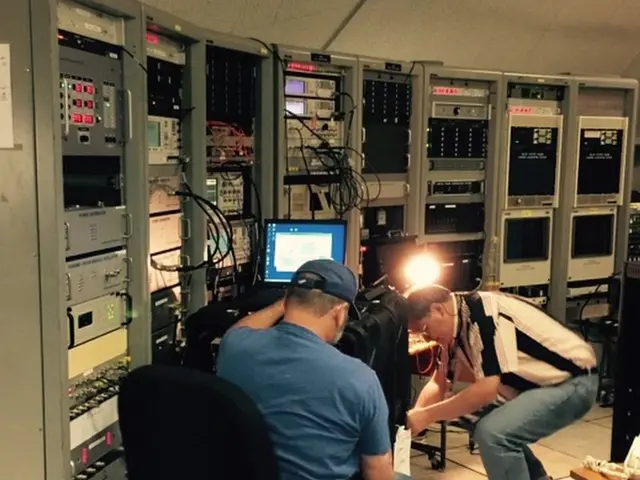Bavaria's Booming Wind and Solar Cooperatives: Stepping Up to the Energy Challenge
Independent energy groups continue to gain popularity, even with affordable electricity available. - Thriving Energy Collectives: Affordable Power Remains Popular Choice
In defiance of cheap electricity prices and capricious weather, wind and solar cooperatives in Bavaria are gaining momentum - with 346 energy cooperatives popping up as of the end of last year, marking a striking 5% increase, as reported by the Bavarian Cooperative Association (GVB). But 2024 wasn't particularly kind to these green pioneers, as both cheaper electricity prices and fewer sunshine hours caused a dip in revenue by 30 million euros, lowering it to 431 million euros.
Yet the spirited spirit of renewable energy is far from quelled. Stefan Müller, GVB's president, stresses the significance of energy cooperatives, stating, "They represent genuine citizen participation, which fosters local acceptability and value." And it's not just wind and solar cooperatives thriving. The count of heat cooperatives, which utilize energy generated in biomass plants, also swelled by 17, reaching a total of 157.
GVB, which houses over 1,044 cooperatives in various sectors, including agriculture, has roots tracing back to the 19th-century agricultural self-help associations. Agricultural-related companies still have a strong presence today, with agricultural trading cooperatives and dairy cooperatives, including dairies, among them. To the delight of dairy cooperatives, the past year came with high milk and butter prices, causing a 2.6% increase in revenue to approximately 4 billion euros. Overall, the turnover of Bavarian goods and services cooperatives collectively increased by almost 3.2% to around 17 billion euros.
The Unstoppable Rise of Renewables
So, what is driving this surge of cooperatives focused on renewable energy? From fostering community engagement to integrating technological advancements, the answer lies in a multitude of factors.
Cooperatives and Community
Let's face it - who doesn't love being part of something bigger? Cooperatives allow local communities to own and manage renewable energy projects, cultivating a sense of belonging and financial rewards. Additionally, energy cooperatives generate local economic growth by creating jobs and reducing dependence on external energy sources.
A Policy-Backed Revolution
Policies and incentives play a crucial role in encouraging the growth of renewable energy. The German Renewable Energy Act (EEG), despite facing some changes, continues to support renewable energy projects, luring cooperatives into investing in wind and solar power. The country's commitment to reducing carbon emissions and achieving climate targets also fuels the development of renewable energy sources.
Power Up With Technology
Technological advancements have swooped in to save the day, making solar and wind power more efficient. Improved technology helps mitigate the impacts of unfavorable weather conditions and enhances the overall viability of such projects. Moreover, the strategic integration of various renewable sources diversifies the energy mix, bolstering energy security and reliability.
Overcoming Challenges, Pushing Forward
Cheap Electricity and Weather Woes
While affordability is important, some cooperatives remain steadfast in their pursuit of long-term sustainability and community benefits, bucking the trend of prioritizing short-term cost savings. As for the volatile weather conditions, advancements in technology and shrewd planning help keep these cooperatives on their feet.
The Future Is Bright for Bavaria's Green Cooperatives
With the Bavarian Energy Forum 2025 on the horizon and regional policies championing renewable energy projects, the future appears promising for Bavaria's green cooperatives. The party doesn't seem to be slowing down anytime soon as the cooperation between community, policy, and technology continues to push the boundaries of renewable energy.
In the context of Bavaria's growing renewable energy sector, employment opportunities are burgeoning within the industry as a result of the increasing number of wind and solar cooperatives, along with heat cooperatives utilizing biomass energy. These cooperatives contribute not only to local economic growth but also foster community engagement by offering opportunities for citizen participation and financial rewards.
Moreover, policy support through incentives such as the German Renewable Energy Act (EEG) encourages the expansion of renewable energy projects, reinforcing the nation's commitment to lower carbon emissions and achieving climate targets. As technology advances, the efficiency of solar and wind power projects improves, aiding in overcoming volatility in weather conditions and diversifying the energy mix to ensure energy security and reliability.







